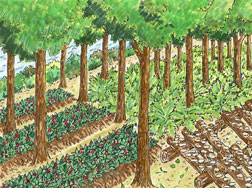 The World Agroforestry Centre (ICRAF) with funding from the Irish Aid Malawi, has been implementing a four-year nation-wide programme known as the Agroforestry Food Security Programme (AFSP) in 11 districts and eight Agricultural Development Divisions (ADDs): Shire Valley, Blantyre, Machinga, Lilongwe, Salima, Kasungu, Mzuzu, and Karonga ADDs since its inception in January 2007. ICRAF is maintaining the existing national partnership arrangement initiated in the first year. Partners included government departments, research institutions, Universities and national farmers organisation (namely: DAES, DARS, LRCD, DAHLD, FORESTRY DEPT, MZUNI, UNIMA, and NASFAM). Project funds and resources are directly shared with the partners receiving approximately 60% of the operational budget, and additional field support.
The World Agroforestry Centre (ICRAF) with funding from the Irish Aid Malawi, has been implementing a four-year nation-wide programme known as the Agroforestry Food Security Programme (AFSP) in 11 districts and eight Agricultural Development Divisions (ADDs): Shire Valley, Blantyre, Machinga, Lilongwe, Salima, Kasungu, Mzuzu, and Karonga ADDs since its inception in January 2007. ICRAF is maintaining the existing national partnership arrangement initiated in the first year. Partners included government departments, research institutions, Universities and national farmers organisation (namely: DAES, DARS, LRCD, DAHLD, FORESTRY DEPT, MZUNI, UNIMA, and NASFAM). Project funds and resources are directly shared with the partners receiving approximately 60% of the operational budget, and additional field support.
Programme activities carried out include among others: planning and review meetings, recruitment of three new programme staff, procurement, sourcing, packaging and distribution of quality tree seeds to farmers through partners; Establishing biophysical suitability and niches of Agroforestry species using GIS mapping, production and dissemination of extension materials, training farmers and extension staff in agroforestry technologies, partner coordination, monitoring and facilitating policy review meetings. .
The progress achieved for each of the planned activities are reported by outcome and output based on the approved Results Based Management (RBM) framework developed at appraisal with the 2nd AFSP Review and Planning workshop held at the Sun ’n Sand Hotel in Mangochi on 30-31 March 2009.
Overall, the programme is on track and the following highlights were achieved during the period under review:
- Farmers were supported with agroforestry extension materials and seed and seedling inputs during the year with over 50% being women
- Farmers participated in agroforestry field days held in the various districts
- Farmers were trained in various agroforestry practices (close to 60% women);
- Seed of various agroforestry tree species were sourced and/or procured and distributed; seed of diverse fruit tree species (mango stones, avocadoes, peaches, guava, etc) were procured and used. More tree seed are available from within the country as part of the impact of the AFSP as most of the seeds are sourced from farmers themselves.
- More than 90% of seed sachets distributed were fertiliser tree system as the AFSP focuses mainly on food security;
- Fruit tree seedlings were produced/distributed to farmers. Of these, 72,008 fruit tree seedlings were produced in 119 community nurseries and 101,782 were produced in centralised nurseries (33,780) were grafted/budded);
- New seed orchards and fruit mother clone banks were established on farmers’ fields and also on-station; existing tree seed orchards and mother clone banks are being maintained;
- Road side demonstrations were established or maintained;
- Brochures and, extension materials were reproduced and distributed to farmers.
- Working Paper was published on the status of fruit production, processing and marketing ;
- Joint strategic working meetings, follow-ups and monitoring and backstopping visits/meetings were held with partners; also Irish Aid monitoring missions were hosted;
- Seminars on “Lessons Learning” were done with stakeholders. Key lessons are being incorporated in the programme. For instance, Conservation agriculture was found to be a common interest for most stakeholders.
- Policy review meetings were held.
- A draft Policy Review Report has been produced. The reviewed found that there has not been a specific Agroforestry policy. It recommends what needs to be done to achieve this.
There are some challenges experienced in the AFSP implementation such as dry spells, wild fire, overriding government priorities and reduced funding that affected some activities.
PROGRAMME DESCRIPTION
By testing and adopting agroforestry, the AFSP is expected to positively impact on the livelihoods of smallholder farmers and their families in 11 selected districts in the southern, central and northern regions of Malawi (Salima, Dedza, Ntcheu, Lilongwe, Chikwawa, Mulanje, Machinga, Thyolo, Ntchisi, Mzimba and Karonga) as shown in Figure 1. The AFSP supports smallholder farmers through germplasm provision, training and information necessary to implement Agroforestry for improving the food security, nutrition and livelihoods in Malawi through the use of sustainable proven agroforestry technologies. The agroforestry technologies being promoted include fertilizer trees, fruit trees, fodder and fuel-wood options. The adoption of these technologies is expected to raise the productivity of land and labour, overall production of food, improved nutrition and income generation from the sale of excess maize and through the processing and marketing of tree products.
The overall programme purpose is to combine proven science, effective partnership and informed policies that will help to increase food security and income, and improve livelihood opportunities for rural communities in Malawi, through accelerated adoption of fertilizer trees and fruit tree portfolios. The programme targets 200,000 farmers over a four-year implementation timeframe; which is expected to have a positive impact on up to 1.3 million people in terms of food security.
PROGRAMME OBJECTIVES
The AFSP has six specific objectives as follows:
- Target, prioritize, adapt and demonstrate fertilizer, fodder, fruit and fuel-wood trees portfolio options in eleven selected districts with suitable biophysical, geographical and social niches for agroforestry interventions, including vulnerable sub-populations (HIV/AIDS afflicted, food insecure, poor, women);
- Engage partners in developing and applying strategies for sustainable supply and delivery systems of quality tree germplasm to meet massive demand by smallholder farmers;
- Engage, mobilize and sensitize policy makers to formulate appropriate policy mechanisms and instruments for mainstreaming agroforestry and catalyzing its adoption at the district and national levels;
- Improve strategies for accessing functional and equitable input markets and market support systems for agroforestry products that increase prices paid to farmers for their outputs and reduce costs incurred by farmers for needed inputs;
- Strengthen and mobilize the capacity of national and local institutions and development agencies in scaling up agro-forestry and develop strategies for institutionalizing agroforestry research for development in Malawi;
- Mainstream agro-forestry into national development plans and community based land-use and management practices.
Source : http://worldagroforestry.org/newsroom/highlights/agroforestry-food-security-programme-afsp-malawi

.jpeg&w=60&q=100&h=60)




.jpeg&w=60&q=100&h=60)






Keep on writing, great job!
my homepage … vpn special coupon code 2024
Please let me know if you’re looking for a writer for
your weblog. You have some really good articles and I feel I would be a good
asset. If you ever want to take some of the load off, I’d really like to write some content for your blog in exchange for a link back to mine.
Please shoot me an e-mail if interested. Many thanks!
Here is my homepage … vpn special coupon code 2024